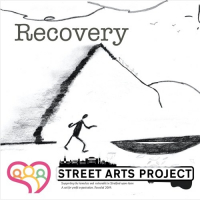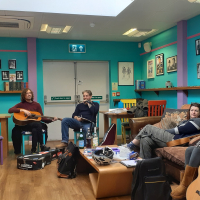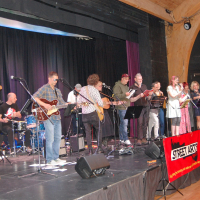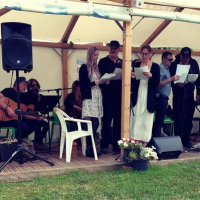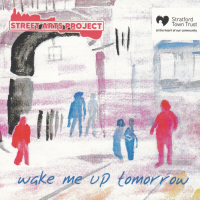'Recovery' by Street Arts Project
Review
I'm delighted to be able to tell you about ‘Recovery', the new album by the Street Arts Project, which comes out on 1st September, with a launch gig on 2nd September at Stratford Playhouse (where many of the workshops which built the songs were held) and which will feature live music from Jen Waghorn, Karl Wheeler and the Street Arts Band and group members performing their work.
The follow up to last year's ‘Wake Me Up Tomorrow' (and you can find the title track on ‘Hot Music Live Presents Volume Eight' as well), the album is the third from Street Arts Project, which, as many of you will know, is a non-profit charity that works with vulnerable adults and those with lived experience of homelessness in the Stratford upon Avon area, and which was set up by Jackie Lines and Doug Armstrong.
As before, the lyrics for all the songs were written by participants at the workshops, developed through conversation and sharing amongst the group and reflecting their experiences and perspectives. At that point, professional musical support kicked into in order to help realise the words into full songs: in this case, the input came from the afore-mentioned Street Arts Band, namely Jack Blackman, Wes Finch, Ben Haines, Katherine Abbott, Jono Wright & Geoff Carr (so many of whom of course have also featured in these pages & on ‘Hot Music Live Presents' with their own music). Jack & Wes then recorded the songs at Stratford United Reformed Church & Stratford Playhouse.
The group members who participated in the writing, composition & performance of the songs were Laurence, Katie, two separate Richards, Janey, Phil, Annette, Saeedeh, Alex, Karen & Angie and the tracks they made together are titled "Make Time", "Recovery" & "January Blues" (by the whole group), "Dream Song" & "Good Friends" (by the Women's Group), Too Many Choices" (by Laurence), "Gilly" (by Katie), "Song for Lilymae" (by Alex), "Normal Song" (by Phil) and "Land of the Unknown" (by Janey).
As you'll know, I have a huge respect for what everyone was doing and the resultant music, while emotional powerful and telling stories the world should hear, sits up there in value with the process its creators experienced in making it: I'm sure terms like empowering & cathartic are appropriate and to my mind, I'd like to commend to you that (which I did not witness) equally with the recorded music which is what I ordinarily focus upon.
It cannot have been easy for anyone involved: those writing the songs have had journeys which have to say the least been traumatic & talking about themselves let alone writing songs, cannot have been without considerable challenges. For those supporting them, I imagine that building confidence came a long way before the nuts & bolts of chord sequences & tempos: helping musical novices to write their songs when you are a professional must take a lot of thought and understanding: getting the balance right so the tracks remain those of their writers and not of their collaborators, however well meaning.
Of course third time around, these balances & methods are fine tuned & once again, the listener is struck by the clarity & power of the songs. It would I suppose be tempting to look at the overall value of the project (which is considerable) and not apply the usual critical reviewing filter: which would be rather patronising I think.
I'm sure the basic ideas benefit greatly from being set into well constructed musical frameworks: even with the lightest of touches. However listening to them, the authenticity & truth of the emotions & narratives matches anything I've been reporting on from more established artists. "Roots" is a pretty broad definition (which helps us reviewers) but to my ear these are roots songs and in many ways there are crossovers with subjects covered in the classic blues etc.
I'm advised that the title track will be the lead single: I'm sure its own title will need no explanation in the context. Utilising the voices of group members in sequence & harmony, it pulls off the trick of managing to make so many different lead vocals work together (with a mixture of male & female voices & I presume a range of natural singing registers that can't have been as easy as they make it sound): a sort of Band Aid approach, except that light touch of arrangement (a pleasant country blues with plenty of harmonica to add character) permits the poignant words around the patience required to cover to take centre stage with none of the bombast used in 1984 to distract from the dodgy lyrics necessary in this project.
As you can see from the songs, there are a higher proportion of these songs which thread together the thoughts of several people on the same subject, as compared with those featuring a single person's, than there was on the previous album. I'm not too sure the reason behind this: maybe that's something which just evolved out of the workshop process. It certainly must help those members who'd prefer just to add a few vocals & words rather than have to do so for a whole track, but it also serves to emphasise the common aspects of experiences among a diverse group of people & hence stress the value of sharing, finding common ground & finding community where once they might have felt relatively excluded. There is surely no coincidence that the project has also released a single of John Lennon's "Isolation" nor that Phil came up with his "Normal Song": one of my favourites on the album. Senses of marginalisation & feeling that others do not see you as "normal" (whatever that might be as Phil reminds us) need challenging.
Ultimately, I feel that however well meant my observations are, they are not as integral to capturing the essence of how the record came into being as the testimony of those who were part of it: so thanks to Jackie & Jack for the following quotations:
"What makes this one more interesting is that we have a much larger group of people now, mainly with mental health issues, some complex and some on the spectrum. So some of the songs, that they are actually singing themselves, are really poignant.
The project is fulfilling everything that the funders wanted and more and it just goes to show the power of music. It is a rich story of those who were lost and unheard, lonely and marginalised, coming together to be heard, valued and respected". (Jackie Lines)
I think this album is really special for me in particular because the voices of those who are vulnerable, isolated or homeless are being heard more than any of our previous albums. They are best at conveying the lyrics they wrote, whether it's sad, frustrated, funny or joyful and we deliberately set out to share their voices with this project. The reaction of the participants when they first heard themselves singing their lyrics when we finished the final mixes makes it all worthwhile. Saeedeh who is Iranian and sings the unaccompanied Farsi song said - ‘I am very happy and I am shedding happy tears because you chose a part of that song in Farsi and it was very exciting for me. From the beginning of the song, I was waiting for the English part, but when I heard my voice in Farsi, I was surprised and cried tears of joy'." (Jack Blackman)
Like me, you may initially link the title ‘Recovery' to practical issues such as getting better from illness or overcoming substance issues. I think once you've played the album, you might also see how the songwriters have used it to talk about more abstract idea: recovering senses of identity, of self belief & ownership of stories. You will not find self pity on the record: it reeks instead of cautious optimism that this is a helpful step on a road back to where they might once have been & where they'd like to be next.
The songs not only cover something of a range of styles (you can hear gospel, soul, country, folk & a light touch of the blues) but reflect a lot, pose & seek to answer questions, find positives and push back against negatives.
One final word from Jackie which I think is essential that I share: "The words and performances recorded also reflect the friendships and fun that these sessions have nurtured."

